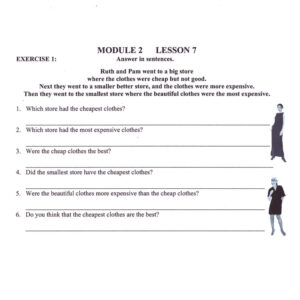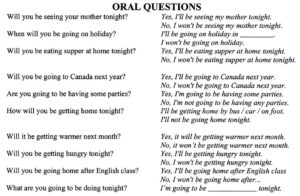Using Your ESL Curriculum
- Posted by Daisy Stocker
- Date October 15, 2014
- Comments 0 comment

How do you use your curriculum?
ESL Adult Curriculum are available by the thousands. If you have already chosen a curriculum, in all probability it is satisfactory, but how the teacher uses it is the big question.
Often the students attend English classes after a hard day’s work, so there must be some social benefits for them, stemming from a good class spirit, and most importantly, they must enjoy their time spent in the classroom. One thing is certain: learning English is hard work, and if hard work is all you can offer them, eventually they will give up. So, whatever curriculum you are using make it your own! Modify the delivery of the content so that there is lots of variety in the lesson, and so that the students can laugh and enjoy themselves.
Rough outline of a format for a lesson
Greetings:
When I first started teaching I asked each student to make a name tag on papers I distributed. I went around and greeted each one personally. I needed it to learn their names, but it is a super way to teach the various greetings we use every day: “How are you?,” “How’s it going?,” “How goes it?”.
Soon I found little things about the students that I could incorporate into their greeting, like: “How’s the cold? Is it better?” Then there was one that always brought a laugh when I asked a teen aged boy: “How do you like sitting next to your sister?” One night, after a few months, I decided that I would skip the greeting, and start right in with the lesson. Immediately, one of the girls put up her hand and said “George, you forgot to say hello to us!” They valued this personal contact at the beginning of the classes.
The Hard Stuff:
The vocabulary, and the concepts of the lesson are the most difficult for the students to grasp. Do this part of the lesson first, while the students are still fresh. What the students want is the bare facts, and then a chance to use the information presented. If you talk for more than five minutes, you will see the students losing interest, and fidgeting. Give them the information, and a few examples, then let them work on a written exercise, to try it out for themselves.
Next – Written Exercises
Once the students have the concept, and you have provided examples, they should be ready for a written exercise. It is often good to stop them after they have done the first five questions and ask your students to read what they have written. If it is a particularly hard concept, pick out one of your good students and say: “Maria, what did you write for question number one?” Write the answers on the board if there is any hesitation.
Written Exercises

Next – Oral Questions
A good curriculum should include oral questions for each lesson. There should be 10 to 15 questions that the teacher can ask the students to answer orally in turn. These should be based upon the concept just taught, so that the students can practice using their new skill. While one is answering, the others are listening, so that it becomes familiar to them.

Next – Group Activities
Small Group Activity:
If there are more written questions included with the lesson, consider making this into a small group activity. The students always enjoy working in small groups with their friends, and they can help each other with their mistakes.
Whole Class Activity:
Finish the class on a high note! There are hundreds of fun activities that will give the students lots of practice, while they have fun together. Remember, learning is best when the students are relaxed and having a good time!
Quick Tips for Using your new Curriculum
First Review Thoroughly: Take time to thoroughly review and familiarize yourself with the materials, including textbooks, workbooks, audiovisual resources, and supplementary materials. Understanding the structure and content will help you plan your lessons effectively.
Plan Lessons with Student Needs: When planning ahead, consider your students needs and goals and tailor the curriculum to their needs. Adapt activities, exercises, and assessments as necessary to ensure they are engaging and relevant. You don’t need to use every exercise and you don’t need to use the lessons exactly as provided.
Use Technology Wisely: First- make sure it all works and your tech devices are setup.
Ask for Feedback and Adapt: Feedback from students about their learning experience with the new curriculum and take notes. Use their feedback to adjustment and improve.
Tips for Using a New Curriculum
- Look Through and Familiarize Yourself Curriculum:
- Read through the entire curriculum and especially the teacher guide .
- Highlight any areas that are new or different from your previous teaching methods.
- Always – Understand Your Students:
- Hopefully before now you understand your students’ levels and learning styles.
- Adapt the curriculum to meet the diverse needs of your students.
- Be Flexible:
- Things probably won’t go as you think! Be prepared to adjust your lesson based on what works best .
- Don’t be afraid to skip or modify activities that aren’t effective.
- Regularly Assess:
- Conduct regular assessments to monitor student progress.
- Reflect on what’s working and what’s not, and make necessary adjustments.
Choosing and Using and Adult Curriculum
- Spending Less on Curriculum - Many of the countries of the world are facing difficult economic times. Radical changes are taking place each day as people struggle to earn enough to maintain their standard of …
- Using Your ESL Curriculum - ESL Adult Curriculum are available by the thousands. If you have already chosen a curriculum, in all probability it is satisfactory, but how the teacher uses it is the big question. …
- Getting English Second Language Beginners Started with Our Curriculum - When beginning students enroll in an ESL class, they are likely to come in with quite a bit of anxiety. They want to learn English, but many of them will …
- Tips on Choosing an ESL Curriculum - “Why, that’s easy”, you might say, “it is to teach English students to speak ” If that’s the case, why do so many programs fail? In Canada, most students took …
Date Published: 2014-10-15
Date Modified: 2024-05-21
Daisy Stocker taught ESL in Eastern Europe for 10 years and was a primary school teacher in Canada for 30 years. Daisy has a B.A. and M Ed. in Education.
You may also like

Spending Less on Curriculum
Getting English Second Language Beginners Started with Our Curriculum
When beginning students enroll in an ESL class, they are likely to come in with quite a bit of anxiety. They want to learn English, but many of them will …
Tips on Choosing an ESL Curriculum
“Why, that’s easy”, you might say, “it is to teach English students to speak ” If that’s the case, why do so many programs fail? In Canada, most students took …
